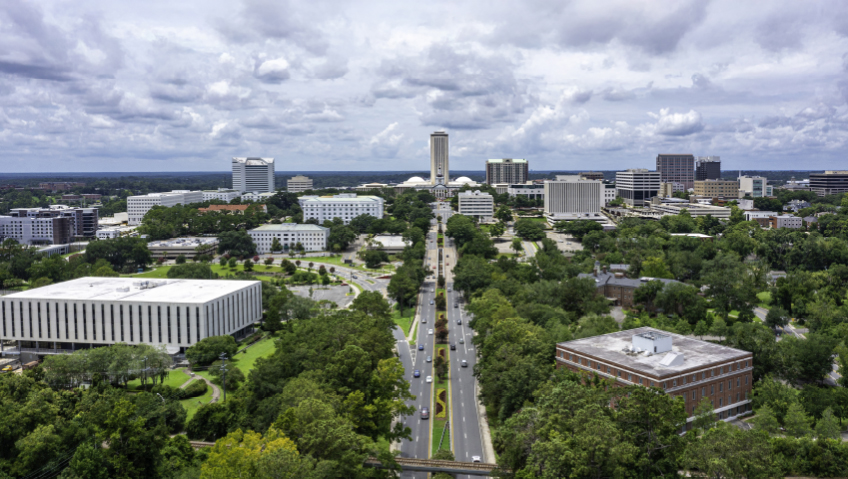The City of Thomaston, Georgia is going through a revival. With the beautiful landmark courthouse, built in the neoclassical revival style in 1908, at its heart, this friendly community is renewing more than just its sense of duty and can-do spirit.
Today, the local economy is flourishing, bringing this charming place into an era of prosperity like the one it knew over a century ago. After many years of preparing new infrastructure, Thomaston-Upson County Industrial Development Authority (TUCIDA) welcomes entrepreneurs and companies looking to put down roots in a trade- and industry-friendly city with a strong workforce and room to grow.
Two centuries interwoven with cotton
Incorporated in 1825, Thomaston has played a crucial role in America’s cotton industry since the late-1800s. As the seat of Upson County (current population 28,000), the city became a recognized industrial hub, with Thomaston Cotton Mills exporting its fabrics around the world, alongside the cotton products of other artisans who made their mark on the local economy.
Although most of the industry would suffer tremendously a century later, coming to a sad end only one year into the new millennium, Thomaston Mills and others continue to produce their premium fabrics, helping to maintain the soul of the city and the county.
With several new industries now developing, regular enquiries to relocate here, and around 300 existing business listings, this city of 9,800 is industrious and future oriented. Board member and native of the town, Jennifer Rogers, tells us that the IDA chair recently noted that they have never before been this busy in the five years he has served on the board. “It’s a very exciting time for us,” she says.
It comes as no surprise, then, that the community’s downtown area is now growing in leaps and bounds following considerable renovations—and a new hotel may soon be joining the mix.
Executive Director Slade Gulledge explains that since Thomaston’s industrial downturn came as the result of unfavorable multinational trade agreements, rebuilding the prosperity that was lost is a significant and ongoing task. Deliberate diversification will be the city’s key to buffering against future misfortune. “Our main focus is to make sure that we have a lot of great places for people to work that are in different types of industries,” Gulledge says of TUCIDA’s efforts to welcome everyone from retailers to industrial outfits.
To achieve its goals, TUCIDA is lucky enough to have an exceptional board including county and local representatives who all genuinely care about the region as a whole. “Economic development is for everybody. We’re not just doing it for the city or the county,” Gulledge says, highlighting the importance of maintaining cohesion amidst its efforts. Many board members are born-and-bred Thomastonians.
Heart and Soul
Rogers recounts how many of her generation chose to return home to Thomaston during its low times after exploring other places, committing themselves to creating a city they are happy to call home once again. As a result, one of the initiatives that took shape was the Community Heart & Soul Program through the Orton Family Foundation, the first community to complete the initiative in the state of Georgia, coordinated by Rogers and partnering with Georgia EMC.
The two-year program was a collaboration between the city, county, and other stakeholders wherein citizens gathered to share what they felt would make Thomaston great once more. This data was carefully collected and analyzed, and then it was all systems go.
“There was real revitalization,” Rogers says. “That was about five years ago, and we haven’t stopped since.” Of all these goals, the community’s biggest wish was to retain its rural soul while growing employment and the economy at a steady pace.
Through transparency and owning their commitments, all stakeholders were issued clear action plans that continue to be closely monitored to ensure success. Gulledge describes his introduction to the program, with his appointment about a year ago, as impressive. The number of goals that had already been achieved by the time of his arrival made it clear to him that he had landed in a most enterprising community. Seeing this inspired him to help and play his part in taking the community forward.
Today, large companies like Marriott, with their ‘Made-in-America’ policy on towels, ensure that a company like Thomaston’s Standard Textile can help the city thrive by boosting its legacy industry, standing on the shoulders of the giants who originally built it.
These giants are not forgotten, either—a local park is dedicated to their memory, while Silvertown Historic Mill Village, commissioned by Martha Mills in 1929, is still in existence. A respected city planner and landscape architect of those times, Earle Sumner Draper, combined forces with Robert and Company, an engineering and architectural firm, in 1929. One could argue that the designers were ahead of their time, as they worked to protect nature in every way they could while creating a spacious layout for a well-functioning village complete with churches and schools.
Acknowledged in the National Register of Historic Places as a historic district, Silvertown was incorporated into Thomaston in the late 1950s. The great-great-grandchildren of many of the old-time millworkers still work in this industry for companies in Thomaston that specialize in various types of cotton fabrics.
Making the move
Amongst the newer, unrelated firms that now call Thomaston home is Brightmark, an industrial renewable plastics outfit that responded to the community’s handsome incentives to move here. The company is set to soon bring investments of over 900 million dollars and employment for around 200 individuals to Thomaston-Upson.
There is also the Tidal Wave Auto Spa, a car wash company with 200 employees in downtown Thomaston and wash locations across the United States. Moreover, Thomaston recently welcomed Value Smart Products, a manufacturer of dish and laundry additives, who moved into an original Thomaston Mills factory space and is already looking to expand.
In addition, the local industrial park is seeing both organic and planned growth. Companies settling here benefit from a regional airfield with a 6,350-foot runway right next door and accordingly, there are also aircraft maintenance and repair service companies that call Thomaston home.
Another collection of projects currently remains under wraps but represents around 6 billion dollars’ worth of potential investment and around 2,000 potential jobs for the region. While all will be revealed in due course regarding these projects, the good news in the meantime is that the community’s current priority is to ensure sufficient housing to support such expansion.
A special place
“It’s a really good time. We’re on the cusp of something big happening,” Gulledge says of the leap the city is poised for. Handily situated within Georgia’s Golden Triangle, an hour or so away from the cities of Columbus, Atlanta, and Macon and just 60 miles from an international airport, there is no reason for this lovely place to lose its small-town feel while gearing up to be home to big national brands. With a daily three-minute commute between his office and his home in Silvertown Village, Gulledge could not recommend the lifestyle more.
Part of Thomaston’s appeal is how family-friendly it is, considering its natural beauty combined with robust infrastructure. With an outstanding school district and nearby tertiary institutions, quality education is certainly taken care of, and the well-equipped regional hospital is continuously expanding its facilities.
There is also a plethora of activities to enjoy including kayaking, skydiving, a selection of beautiful parks to visit, and a soon-to-come local farmers market, a signature community project resulting from the Heart & Soul Program. This new downtown venue will host festivals, concerts, and other community get-togethers.
Open for business
Passionate about creating opportunities for “real careers,” Rogers says that a great number of local employees are now under 40 years of age, lending a sense of vibrancy to the town that it perhaps did not have just a few years ago. “The huge increase in entrepreneurship over the last couple of years has been impressive,” she adds.
Gulledge agrees that it is imperative not to become a “net exporter of local talent,” predicting a race for space to hit the downtown area once the hotel plans come to pass.
Speaking of local talent, Thomaston’s artisanal scene is also thriving. Blessed with lovely boutiques and specialty shops, its future retail strategy includes plans to strengthen this sector even further.
With great access to water resources, easy logistical access, and a local and regional workforce equipped to handle the challenges of advanced manufacturing, TUCIDA is on a roll, continuing to bring more industry to the area with the full support of residents and board members who are dedicated to change and growth—and to being the change they wish to see.
Additionally, with the small-town superpower of bringing together the right people in a single space to make positive change happen quickly, Gulledge and Rogers are clear about Thomaston-Upson being open to good deals that foster strategic growth. “We’re very excited about the future,” says Gulledge, “and we want to make sure everybody knows we’re open for business.”






